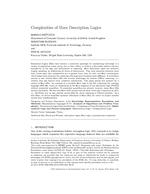Complexities of Horn Description Logics
Aus International Center for Computational Logic
Complexities of Horn Description Logics
Markus KrötzschMarkus Krötzsch, Sebastian RudolphSebastian Rudolph, Pascal HitzlerPascal Hitzler
Markus Krötzsch, Sebastian Rudolph, Pascal Hitzler
Complexities of Horn Description Logics
ACM Trans. Comput. Log., 14(1):2, 2013
Complexities of Horn Description Logics
ACM Trans. Comput. Log., 14(1):2, 2013
- KurzfassungAbstract
Description Logics (DLs) have become a prominent paradigm for representing knowledge in a variety of application areas, partly due to their ability to achieve a favourable balance between expressivity of the logic and performance of reasoning. Horn description logics are obtained, roughly speaking, by disallowing all forms of disjunctions. They have attracted attention since their (worst-case) data complexities are in general lower than for their non-Horn counterparts, which makes them attractive for reasoning with large sets of instance data (ABoxes). It is therefore natural to ask whether Horn DLs also provide advantages for schema (TBox) reasoning, i.e., whether they also feature lower combined complexities. This paper settles this question for a variety of Horn DLs. An example of a tractable Horn logic is the DL underlying the ontology language OWL RL, which we characterise as the Horn fragment of the description logic SROIQ without existential quantifiers. If existential quantifiers are allowed, however, many Horn DLs become intractable. We find that Horn-ALC already has the same worst-case complexity as ALC, i.e., ExpTime, but we also identify various DLs for which reasoning is PSpace-complete. As a side effect, we derive simplified syntactic definitions of Horn DLs, for which we exploit suitable normal form transformations. - Weitere Informationen unter:Further Information: Link
- Forschungsgruppe:Research Group: Computational LogicComputational Logic, Wissensbasierte SystemeKnowledge-Based Systems
@article{KRH2013,
author = {Markus Kr{\"{o}}tzsch and Sebastian Rudolph and Pascal Hitzler},
title = {Complexities of Horn Description Logics},
journal = {ACM Trans. Comput. Log.},
volume = {14},
number = {1},
publisher = {ACM},
year = {2013},
pages = {2},
doi = {10.1145/2422085.2422087}
}
